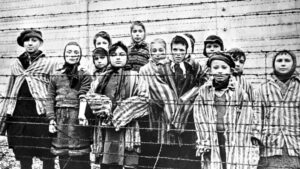Tag: anti-Semitism
Discussing the Effects of Anti-Semitism: Dr. Roger Brooks Recognizes the Work of Rev. Edward Doyle
by The Cowl Editor on April 11, 2019
Campus

by Alexandra Huzyk ’20
News Staff
On Monday, April 8, a special event was held to commemorate Rev. Edward P. Doyle, O.P.
Commonly referred to as, “Our Dominican Liberator,” Rev. Doyle was a professor of both theology and philosophy at Providence College, and was called to serve as an Army Chaplain and Captain during World War II.
Having donated to the College a collection of personal papers and photographs from his experiences in Germany, featured presenter Dr. Roger Brooks, president and CEO of Facing History and Ourselves, sought to explain the significance of Rev. Doyle’s contribution and legacy.
In 1945, Rev. Doyle and others helped to liberate the Nazi concentration camp in Nordhausen, Germany. While tending to people around him, Rev. Doyle documented what he saw with a Brownie camera.
Upon returning back to the United States, Rev. Doyle resumed his role as a professor at the College and eventually taught at a number of other institutions.
In 1996, shortly before Rev. Doyle’s death, he donated his documentation during the war to PC, which is now held in the Philips Memorial Library. Jane Lunin Perel ’15, Professor Emerita, recalled Rev. Doyle coming to her office and entrusting her with the safekeeping of his work.
“Rev. Doyle wanted to make sure that Providence College students would always know that the Holocaust happened,” began Brooks. As a witness of the terrors of the Holocaust and the heroism of the liberators, Rev. Doyle sought to expose the events of history and cultivate dialogue.
Brooks stated that there are multiple ways to know things. The first being a surface knowledge of facts, and the second being a deeper understanding that comes from experience.
Brooks asserted that this second type of knowledge is what Rev.Doyle wanted for generations of PC students to come “so that they might understand as if these experiences were their own.”
The third type of knowledge, Brooks said, is a deeper wisdom that shapes an individual. This can be seen in the statement that has arisen from the tragedies of the Holocaust, “Never again.”
Unfortunately, since the Holocaust, there have been a number of massacres and genocides. Brooks cited violence against political and religious groups in Rwanda, Serbia, and Myanmar. He asserted that even though the saying, “Never again,” has been promulgated, there still exists hatred and discrimination in the modern world.
“People make choices, and choices make history,” stated Brooks. “We first need to face history, and then we need to face ourselves.”
He emphasized that not everyone was an anti-Semite in Germany during the reign of Hitler, but the amount of people in opposition to these beliefs were not numerous enough to change the course of history.
Reflecting on these historical events, Brooks claimed that every individual must take action to fight against hatred. Rev. Doyle’s way to continue his fight against intolerance, and to prompt global and interreligious dialogue, was to donate his collection of documentation.
Brooks believes that we can incorporate this fight into our everyday life, saying, “the next time you hear a joke that is anti-Semitic, racist, or discriminatory, challenge yourself to be an Upstander. Do the work that Father Doyle called you here for.”
Concluding the event, Dr. Brooks invited PC students Jacqueline Michels ’19 and Ann Kleinschmidt ’19 to discuss the impact that Rev. Doyle has had on their lives. Both students had drawn from Rev. Doyle’s archives for their academic work; a testament to the ongoing impact of Father Doyle’s legacy.
“My dad is Jewish, so learning about the Holocaust was learning about my family’s cultural history,” said Michels.
As for the most inspiring element of Rev. Doyle’s work, Michels said that it was, “his emphasis on hope and how when we study the Holocaust we cannot lose hope.”
Kleinschmidt recalled a particular article in which Rev. Doyle had found out about D-Day, having gotten down on his knees amongst a diverse crowd of soldiers and praying together in their respective faiths.
“Chaplains are doctors of the soul,” said Kleinschmidt. As a future medical student, she said, “I am called to walk with people wherever they are in their lives, just as Rev. Doyle did.”
